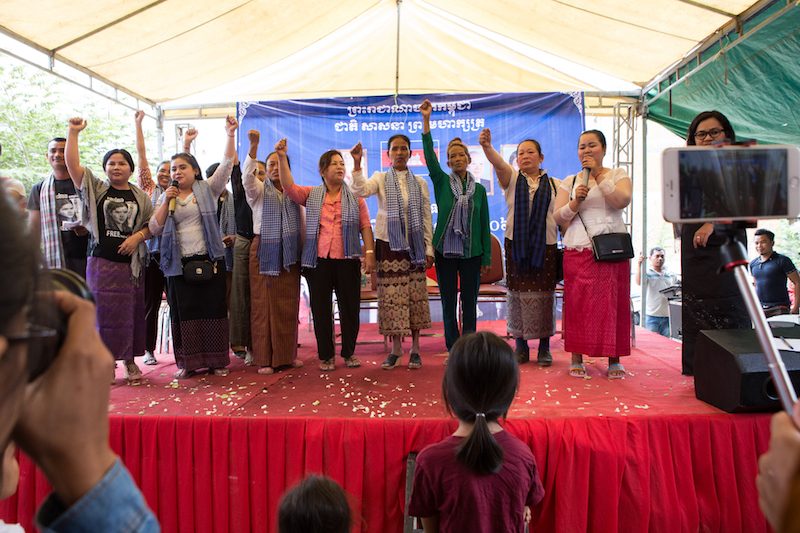Phnom Penh City Hall has rejected a request for an International Women’s Day celebration for the country’s majority-female garment factory workers at Wat Phnom today, though Prime Minister Hun Sen is set to mark the occasion with a speech.
In line with a near-blanket ban on public rallies amid ongoing political tensions, authorities denied a request by the Cambodian Labor Confederation for a public women’s day event, the union’s president, Ath Thorn, said on Tuesday.

“I don’t want to face a problem with authorities, so I decided to rent a place for celebrating,” he said.
With female garment factory workers—a cornerstone of the country’s growing economy—consigned to a private event, it will be left to Mr. Hun Sen to publicly celebrate the day, which began as International Working Women’s Day in 1909 in honor of a garment workers’ strike in New York.
The theme for this year, according to international organizers, is “Be Bold For Change.”
On Tuesday, prominent land rights activists began the celebrations early by defying a ban from City Hall and gathering on a public plot of land in the eviction-hit Boeng Kak neighborhood.
About 80 people showed up to the morning ceremony, which focused on the government’s treatment of land and human rights activists. Despite the rejection of the community’s formal request to hold the event in a public space, authorities stayed away.
Hidden away from main arteries of traffic, the peaceful affair was out of step with gatherings normally held by the group, headed on Tuesday by Song Sreyleap and Pov Sophea, who have both previously been jailed for protesting. The notoriously violent Daun Penh district security guards were absent as supporters listened to speeches and joined sing-alongs inside a marquee draped in banners depicting Tep Vanny, the country’s most prominent land activist.
Ms. Vanny was sentenced to 30 months in prison last month for her role in a protest that turned violent in 2013.
Ms. Sophea, 38, said she wanted to send a message to the government to stop the violent persecution and imprisonment of land activists, who are almost always women.
She said recent beatings and arrests of protesters had stopped her daughters, who are 18 and 21, from following in her footsteps.
“They used to protest when I was in prison, but they are scared now—they don’t want to be like me anymore,” she said.
Ms. Sreyleap, 31, said women rarely received support from the relevant powers.
“The Women’s Affairs Ministry doesn’t do anything,” she said.
She urged other women to stay strong. Fighting for “women’s rights is not just one day—it is every day until you die,” she said.
Phoung Sopheap, 43, another Boeng Kak resident who has been jailed for protesting, had some tangible advice for the government in improving conditions for women: employ them.
“I want more women voices in the government,” she said, adding that it was also an imperative to improve the accessibility of quality education.
Municipal spokesman Met Measpheakdey said authorities did not bother breaking up the event because “there was nothing happening.”
However, the women may be punished for their defiance, he said.
“Now, we are waiting to hear from our upper level,” he said. “If there is any order from the leader, we will take measures.”




